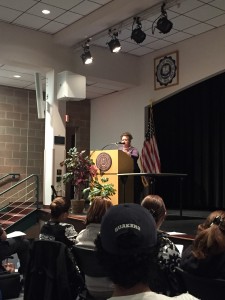 Elizabeth Yeampierre’s words about climate change could aptly be applied to systemic racism.
Elizabeth Yeampierre’s words about climate change could aptly be applied to systemic racism.
“I think it is all overwhelming,” she said, at a talk titled From Puerto Rico to Rhode Island: Raising Voices for Climate Justice. “We need to respect that what is happening right now is the manifestation of years and years of extraction and abuse to basically make a few greedy people happy at the expense of our people and at the expense of our future.”
And that is, in fact, part of Yeampierre’s point – that a necessary response to climate change must include a response to the world’s long history of injustice. On March 20, the six-month anniversary of Hurricane Maria’s pummeling of Puerto Rico, a crowd gathered in downtown Providence to hear Elizabeth Yeampierre talk about climate justice and Puerto Ricans’ local movement to take ownership of the rebuilding of their communities. Yeampierre is the executive director of the Brooklyn non-profit UPROSE and co-chair of the Climate Justice Alliance.
Her work begins as a Puerto Rican organizer in Sunset Park – a community situated by a large marine industrial site in south Brooklyn, New York. Puerto Rican, Dominican, Ecuadorian and Mexican immigrants make up about half of Sunset Park’s population and people of Asian ancestry make up another 40%. UPROSE, directed by Yeampierre, organizes residents around issues of social well-being and environmental adaptation. Residents in the area are concerned that gentrification will strike their community with unaffordable rent prices and amenities for the wealthy. Yeampierre explains that they have fought to clean up instead of get rid of the industrial presence in the area – for, while industrial pollution is hazardous to residents’ health (especially during extreme weather events), the industries also provide jobs to community members and stem the flow of wealthier buyers who are supplanting locals across Brooklyn. It is a harsh reality, but gentrification and extreme weather events are both forces working to disrupt their lives.
This is a kind of climate adaptation that may sound unusual to environmental advocates. But Sunset Park residents lack the luxury of separating the many forces contributing to their insecurity. This is “intersectionality” – the idea that systemic problems are intertwined instead of isolated, a way of approaching environmental challenges that grapples with the tough reality that there is uncomfortable nuance to the solutions people need to live healthy lives now and in the future. Yeampierre brings this perspective to Puerto Rico’s recovery in the aftermath of Hurricane Maria – where a confluence of political and environmental forces threatens Puerto Ricans’ self-determination.
The hurricane was devastating. Hurricane Maria struck the island with 155-mph winds on September 20, 2017. More than 1,000 people were likely killed in the storm, although the official death count remains at 60. Hundreds of thousands of Puerto Ricans are still without power, as the Puerto Rican Electric Power Authority (PREPA) struggles to repair an old and severely damaged electric grid.
Yet, Puerto Rico’s challenges did not begin with Hurricane Maria – the territory has $74 billion in public debt, $49 billion in unfunded pensions owed to workers, and a looming foreclosure crisis. Led by a financial oversight board appointed by Congress, known as PROMESA, bondholders are pushing to ease the debt crisis by closing schools and cutting other public services.
This legacy of extractive colonialism and neo-colonial oversight of the territory’s finances are challenging grassroots efforts to take control of the recovery on the islands and take control over their communities and futures. Yeampierre defines climate justice as the intersection of racial injustice and climate change. She calls on Rhode Islanders to look for community-led solutions to environmental challenges, leaving time at the end of her talk for intra-audience conversations about the role of local Puerto Rican families in island recovery efforts, a discussion of the No LNG in PVD campaign against a proposed natural gas liquefaction facility in South Providence, a conversation about the territorial status of Puerto Rico, and input on Rhode Island’s upcoming Resiliency Plan.
Yeampierre smiles wryly as she describes the number of graduate students who have called her to discuss projects they want to complete in Puerto Rico. She calls on everyone who is concerned about Puerto Rico’s recovery – from political officials to non-profits to eager PhD students with Hurricane Maria-based dissertation ideas to green companies bidding to transform Puerto Rico – to look more deeply at the self-interest embedded in their proposed solutions.
“They can come in and turn our communities into passive recipients of their good intentions,” she says. “The biggest obstacle to addressing climate change is asking people to check their privilege and work in a way that is more of an ally and not a contemporary missionary.”
“As we speak, there are 500,000 Puerto Ricans still in the dark,” Yeampierre says. “The time to do something radical is now.”